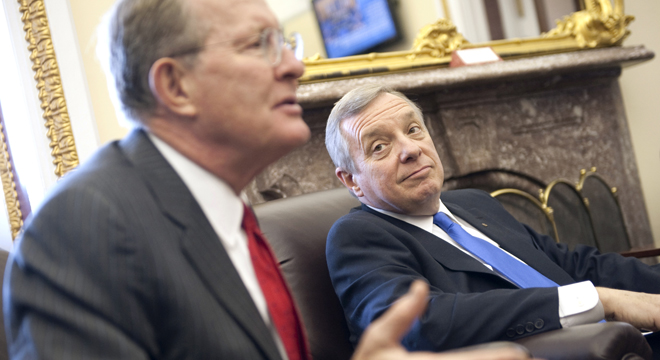Senators Mike Enzi (R-WY), Dick Durbin (D-IL), and Lamar Alexander (R-TN) introduced a new bill on Wednesday morning that tries again on one of their key issues: collecting sales taxes from previously exempt online merchants, namely the largest of the bunch, Amazon and eBay.
“For over a decade, Congress has been debating how to best allow states to collect sales taxes from online retailers in a way that puts Main Street businesses on a level playing field with online retailers,” Senator Alexander said in a statement. “This bill empowers states to make the decision themselves. If they choose to collect already existing sales taxes on all purchases, regardless of whether the sale was online or in store, they can. If they want to keep things the way they are, it’s a state’s choice.”
Durbin was confident the bill would pass Congress this time: “I think we’ve finally found that sweet spot,” he said, the Los Angeles Times reported. The newspaper also noted that Senator Enzi said that states were losing $23 billion annually in uncollected sales taxes to online retailers, apparently citing a 2009 University of Tennessee study that estimated that figure.
The new legislation, called the “Marketplace Fairness Act,” is similar in most respects to the “Main Street Fairness Act” he introduced to the Senate in July, that time with only Democratic support. It was an effort to close a loophole that has allowed online retailers to avoid collecting state sales taxes in places where they don’t have a physical presence. A House version of the Main Street Fairness Act was introduced at the same time by Rep. John Coyners (R-MI).
The loophole was created by a 1992 Supreme Court ruling, Quill Corp. v. North Dakota, in which the court struck down a sales tax that the state of North Dakota had imposed on Quill Corporation, the nation’s largest mail-order office supplier, based in Illinois. Though the decision didn’t apply at all to e-commerce, lawyers from the major e-tailer firms were happy to use that decision as a way to avoid paying sales taxes.
Despite the fact that small businesses by and large thought Durbin’s original legislation was good enough to warrant passing, and despite the fact that it received the support of one of the very entities whose business would be most impacted, Amazon, it and the House bill remain stalled in committees.
That’s because the original legislation failed to get necessary Republican support over a states-rights fight and a related exemption for small-time sellers. (Incidentally, eBay also criticized the bills, saying they would hurt the small businesses and sellers that use its auction/retail service to move goods.)
Specifically, the original Main Street Fairness Act mandated that states sign the “Streamlined Sales and Use Tax Agreement” (SSUTA), a document created in 1999 by the National Governor’s Association (NGA) and the National Conference of State Legislatures (NCSL) and since passed by 24 states, designed specifically to encourage states to voluntarily simplify their myriad sales tax structures into something resembling uniformity, allowing them to tax online retailers.
SSUTA currently offers a small seller tax exemption for businesses that earn less than $500,000 but, that’s subject to change at any time upon the whims of the member states, which turned Republicans off from supporting the original legislation.
As such, on October 11, Reps. Steve Womack (R-AR) and Jackie Speier (D-CA), introduced the “Marketplace Equity Act,” a House bill that was supposed to address the criticism of the Durbin bill, granting states the authority to levy sales taxes on online merchants (“remote sellers” or “remote retailers”) without signing up for SSUTA.
Unfortunately, that legislation, which carved out an exemption for businesses with less than $1 million in annual sales or $100,000 in the specific state attempting to levy taxes, also failed to receive the the support of eBay and some state officials, and so Durbin and his fellow legislators attempted to merge it with their own, offering states carte-blanche, so-to-speak, when it comes to simplifying their tax codes.
Now, in the aptly-named “Marketplace Fairness Act,” states have the option to either join SSUTA or simplify their sales tax codes according to new simplification guidelines in the bill text itself.
Amazon, again, has thrown its support towards the bill. The world’s largest online retailer on Wednesday released the following statement: “Amazon strongly supports enactment of the Enzi-Durbin-Alexander bill and will work with Congress, retailers, and the states to get this bi-partisan legislation passed,” said Paul Misener, Amazon vice president, global public policy. “It’s a win-win resolution – and as analysts have noted, Amazon offers customers the best prices with or without sales tax.”
That’s not so surprising given that Amazon, based in Seattle, prefers to deal with one piece of national legislation to the patchwork of state efforts to extract sales taxes. The company bitterly fought the pioneering California state law drawn up almost expressly to gleen $200 million in annual sales taxes, which was signed by Governor Jerry Brown in September, threatening to cut-off 25,000 small and medium-sized online affiliates based there.
San Jose, CA-based eBay, too, took a familiar position against the new legislation: “This is another Internet sales tax bill that fails to protect small business retailers using the Internet and will unbalance the playing field between giant retailers and small business competitors,” Tod Cohen, eBay’s vice president for government relations, said in a statement, the Seattle Times reported. “It does not make sense to expand Internet sales tax burdens on small businesses at a time when we want entrepreneurs to create jobs and economic activity.”
Whether the bill does pass as Durbin predicts remains to be seen. No hearing had been set for the Marketplace Fairness Act at the time of this posting.









